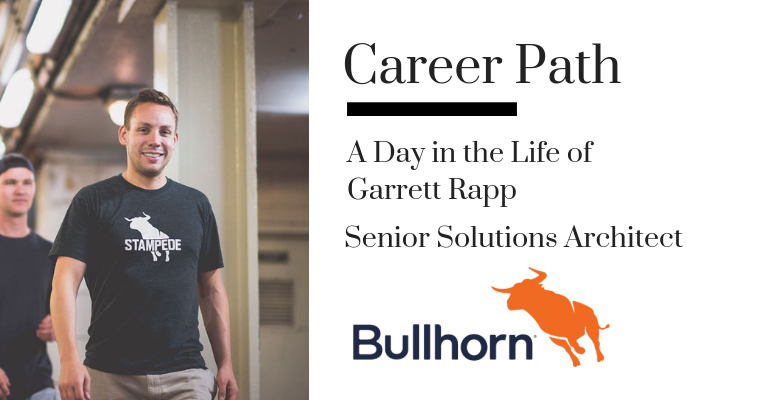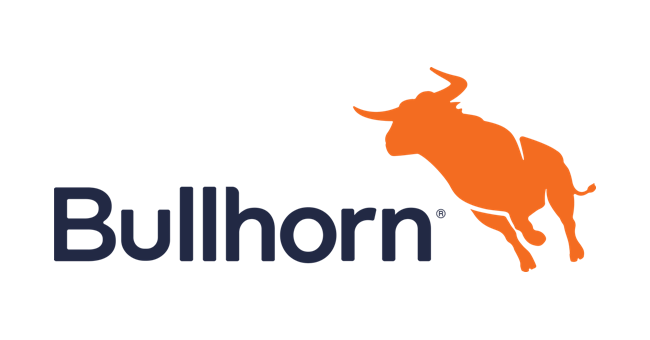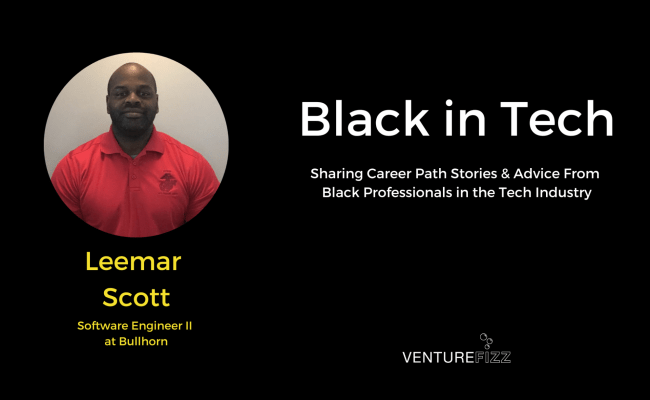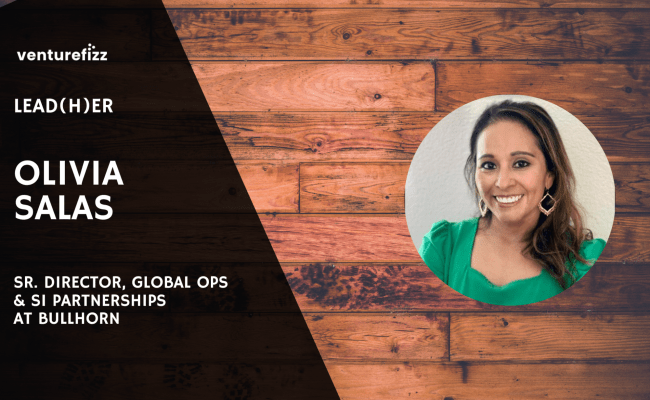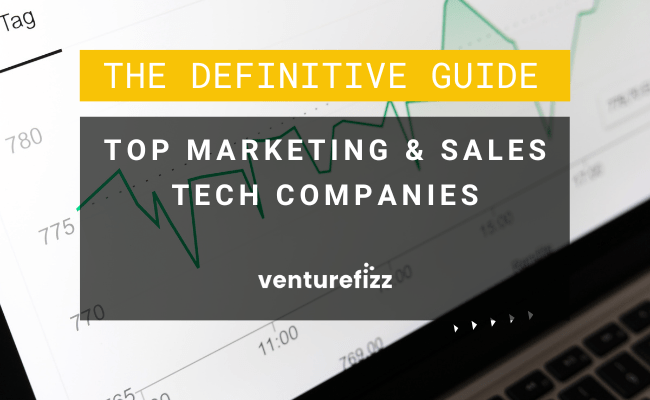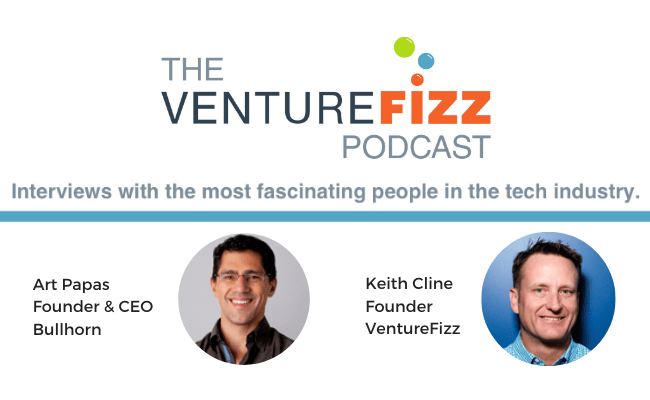What does the career path and a day-in-the-life look like for a Senior Solutions Architect at Bullhorn? We interviewed Garrett Rapp to find out.
Visit Bullhorn's BIZZpage for their latest job opportunities!
Where did you grow up? What did your parents do for work?
I grew up in a town called Harvard, Illinois near the Wisconsin border. My mom was a teacher of all different types (she also has a law degree). Although we lived pretty far into the country, my dad worked as an attorney in downtown Chicago. As a kid, I spent a lot of time roaming around the woods surrounding our property and both reading and emulating Calvin and Hobbes comics. Pretty much the rest of my time was spent playing piano.
Where did you go to college? What did you study and what were some of your initial jobs out of school?
I attended Illinois Wesleyan University (IWU) in Bloomington, Illinois after a tough decision against pursuing piano performance. Instead, I enrolled at IWU as a biology major. By sophomore year, I switched to a religion major while I worked at the campus newspaper and the campus radio station. By junior year, I added an English and writing double major, and going into senior year, I was editor-in-chief of the campus newspaper. I still credit my time behind the wheel of The Argus as one of the most eye-opening and best educational experiences of my college and early career.
After school, I had a brief stint at the University of Chicago in a religion graduate program, from which I ended up withdrawing. At the same time, I was working the phones in an hourly job for TMC, a division of C.H. Robinson (a F250 transportation and 3PL company). I also did contract work in search engine optimization and content development for a company called L2T Media.
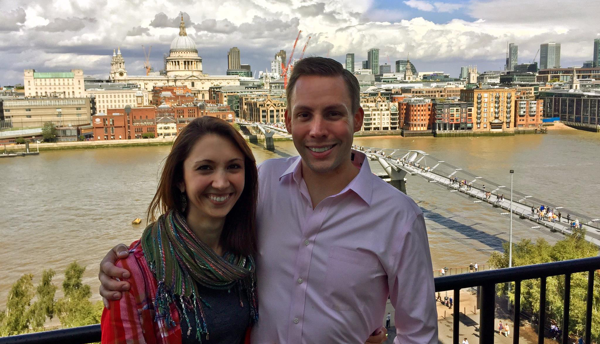
What has attributed to your success thus far and has helped propel you to the position you have now?
For better or worse, if I’d continued in the graduate program I was in, I wouldn’t be here now. That’s not to say I regret it at all though: I got some real exposure to handling debt, grappling with sunk costs (and their associated fallacies), and weighing my pride and the idea of quitting against the likely outcomes and my personal happiness. I made the right choice, and I believe that you can learn a lot from agonizing over hard choices.
There may be a way in which that decision caused me to double down at the job I was working. I really dedicated myself to my career, and over the next several years at TMC in Chicago, I worked my way through several promotions into a key role in their internal Operational Excellence group. This role stoked my interest in consulting as a general career path and in technology (especially automation) as a focus.
What made the most difference at that early stage of my career was an obsession with efficiency, including typing speed, automation, templates, and organization, which freed up time to self-teach. There was no problem that I wouldn’t try to figure out myself first before I asked someone else. If you can afford to spend some time digging around and trying things yourself, you can learn all you need. If you don’t have time to do that, you have to make time for it first.
Can you share the high-level responsibilities of your current position as Senior Solutions Architect at Bullhorn?
Solutions Architect is a broad term, which can mean varying degrees of pre-sale business engagement and technical delivery engagement depending on the business. At Bullhorn, the role truly encompasses both, but a descriptor that really resonates with me is “Solution Owner.”
If we’re implementing our software for a client, we have a project manager who is the delivery owner, but we, as Solution Architects, are responsible for helping to ensure that the holistic solution works for the client. This goes beyond ensuring that our software does what it’s intended to do as outlined in the statement of work. We also need to know what systems the client depends on for their day-to-day operations beyond our software and how our data needs to interact with theirs.
Any tips for someone considering a career in Client Services?
A genuine interest in positive interactions with other people, even those you know little or nothing about, is the single most important piece. Dedication to your customer’s success is table stakes; to excel, you have to put yourself and the urge to blame aside, and refocus on the problem you have in front of you.
If you can find a way to build a rapport with your clients, you’ll enjoy making them successful. Face-to-face interactions make this easier, so I’d recommend opportunities to connect in-person with your clients. Bullhorn hosts an annual conference series called Engage that creates an opportunity for everyone in our company to meet our customers, and it’s consistently a highlight for me.
Beyond this, building your personal toolset is a key ongoing project. Whatever your specialty, try to broaden your horizons. For me in the technology and software space, this means looking at methods of conflict resolution and negotiation (I love the book “Getting to Yes” by Roger Fisher and William Ury), trying to understand profit and loss and balance sheets, and brushing up on consulting skills. Some classic consulting case interview preparation and practice is invaluable for anyone who aims to grow their career.

Day in the Life
Coffee, tea, or nothing?
Lots of coffee! Not too picky about it - I’ll trade quantity for quality here.
What time do you get into the office?
About 7 a.m. I get a lot of mileage out of the first 1.5 hours of office time before my email, phone, and Slack messages start increasing. If I’m onsite with a client, the goal is arriving a minimum of 15 minutes before any meetings with them start, but ideally 20-25 minutes so I’m ready for a productive conversation.
What are three things that motivate you in your role?
-
I care deeply about my team and my department. I’ll go a long way to help other people in my organization because I like seeing them succeed.
-
Getting to be a problem-solver. In most jobs, when you get handed a problem, you actually have a plethora of resources, tools, and some time allocated to solving it. Real-life problems aren’t always that accommodating!
-
Getting to meet, understand, and make a difference for customers directly. I love working with end users of our software (especially in-person, like during user acceptance testing cycles) and helping them learn new things about the tool.
Every day is different, but can you outline what a typical day looks like for you?
This varies throughout the year based on what project I’m working on, but it can involve:
- Participating in client calls (design and requirements, demos, handoffs, and defect reviews)
- Participating in internal calls with our sales department
- Creating statements of work for services engagements
- Creating functional specifications for custom apps and automations
- Troubleshooting or testing our software and custom automations
- Deploying our software
What time do you head out of the office?
Anywhere from 4 p.m. to 6 p.m., depending on what’s going on that day. All bets are off when I’m on-site with a client though - spending from 7 a.m. to 10 p.m. with a client in their “War Room” builds camaraderie!
Do you log back in at night or do you shut it down completely?
I often will log back in at night, if only to file away emails that I don’t have to respond to, or hit off quick answers. I don’t find it stressful to keep up on things after hours - it’s worth it to me to have less noise waiting when I kick off in the morning. It’s relatively rare that I need to get on the phone with my project teams or clients for urgent matters. That said, as a project and implementation consultant, there will be occasional evenings or weekends for working on big deployments and go-lives.
Any productivity hacks?
-
I couldn’t live without organized folders in my inbox, my desktop, my Google Drive, etc.
-
Know when to block yourself off and “hide.” If I have a deep, detailed technical specification to write, I’ll minimize email and Slack, silence my phone, and work in an obscure conference room to avoid interruptions.
-
I think it’s pretty common to freeze up or procrastinate when faced with tough problems. The key thing is to start on them anyway: start simple and don’t aim for perfection, but just start producing something. You can always improve it later, but you haven’t wasted time avoiding your main problem or displacing it with lower priority issues and requests.
What are the 3 apps that you can’t live without?
-
Slack isn’t “the email killer.” Email has a very clear purpose and utility, but I do think that Slack is the ultimate office chat tool, and its iPhone app is excellent.
-
For traveling, ExpenseIt lets me photograph receipts and automatically puts their costs, comments, and allocations into my open expense reports. It’s a great way to not lose track of the money I spend while traveling for business.
-
I use the basic call, calendar, and mail apps a lot, but the other key apps in rotation would be podcasts and Spotify, especially for when I’m traveling.
What professional accomplishment are you proudest of?
Working my way into a technical and software specialist role over the years, given my lack of a technical and software degree, is my proudest accomplishment. The challenge now is staying up to speed!
Who do you admire or call upon for professional advice?
If I call someone for professional advice, it’s likely to be a parent or sibling (who are all pretty accomplished). In terms of admiration, it would be one of my first managers - Adam Gerdel. He ran the Operational Excellence team at my first job, and he became a big role model for how to develop teams that want to work together, how to deliver results while also making time to think outside of the box, and how to support employees both personally and professionally - all while staying ruthlessly focused on efficiency and innovation. He’s a one-in-a-million team leader, and I’m grateful for all that I learned from him.
Keith Cline is the Founder of VentureFizz. Follow him on Twitter: @kcline6.
Top photo courtesy of Maximillian Tortoriello Photography, other photos were provided by Bullhorn.

